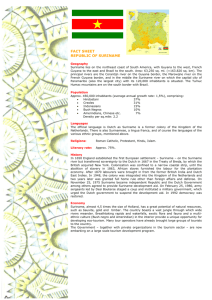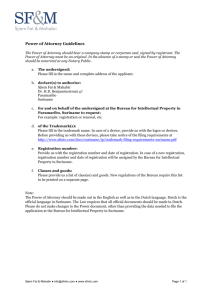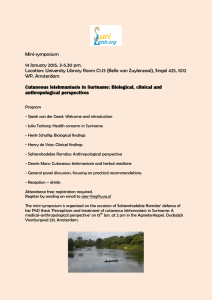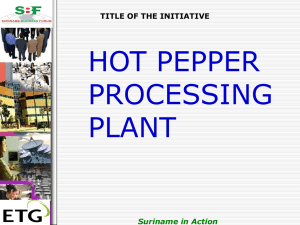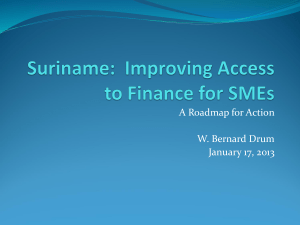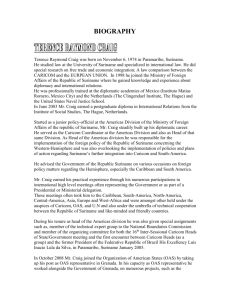Parent Connection Research St. Petersburg College of Education
advertisement
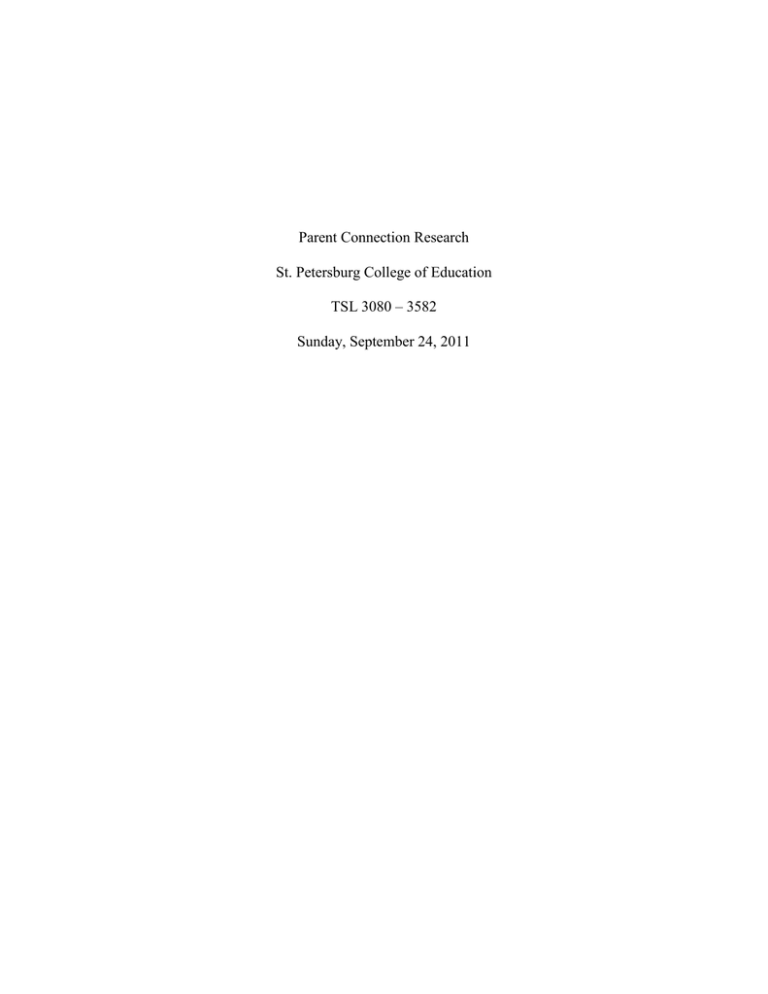
Parent Connection Research St. Petersburg College of Education TSL 3080 – 3582 Sunday, September 24, 2011 Introduction: Many times, immigrant parents do not neglect their children’s education by not being involved in the school (Ariza, 2000). They may show much more interest in their children’s learning at home. Unfortunately, there are many issues that may prevent a parent from being more involved in school activities. The number one reason is probably going to be the language barrier. There are also cultural differences that may affect the way that a parent is involved in their children’s schooling. A parent from another culture, other than our own, may not feel comfortable in a situation where they are expected to mingle with other parents. This discomfort in public situations can come from the language barrier; not being able to properly communicate with others. It can also be caused by a cultural view of things; the parents may not be used to being invited to their child’s school, or at least not for a good reason, or may not be comfortable being introduced to new people, because of their cultural views of meeting strangers. In this paper I will discuss information, on one culture, that may be helpful to teachers. I am writing about the culture of Suriname, whose national language is Dutch. I will research the educational practices of Suriname, and ways that this may affect immigrants who move to the United States. I will also talk about what to expect from students and parents who have migrated from Suriname. Discussion of Research Findings: The Surinamese culture is quite similar to American culture. It is a proverbial melting pot, with people emigrating from Indonesia, India, Africa, China, and Holland (The World Factbook, 2011). It was originally a Dutch colony that separated. From this came the Republic of Suriname. Located in South America, Suriname is a very small country just north of Brazil, bordering the Atlantic Ocean. There are many prevalent languages in Suriname. Although the official language is Dutch, there are also four other languages commonly spoken. Javanese is still quite common among the Indonesian immigrants and Hindi in the Indian population. English is also fairly common, and then there is the native language. The native language of Suriname is Sranang Tongo, which is a Creole language, also known as Surinamese (The World Factbook, 2011). Although there are many differences in regards to the languages used in Suriname, the culture is quite similar to ours. The children attend schools quite similar to those in the United States. The teens interact and begin dating and courtship. The adults choose their marriage partners, though a dowry is still customary. One fairly important distinction is the family structure; the common structure of a Surinamese family is nuclear (Sordjo, Marc). Occasionally an extended family, and rarely are there divorced parents or blended families (Sordjo, Marc). The first thing that will be a big change for parents who have emigrated from Suriname will be the ages that their children are required to be in school. In Suriname they start preprimary education as early as age three, and can go until age five. Pre-primary education is completely voluntary, and is state funded, except in private schools. Students do not start the required primary education until age six. These students will also graduate, on average, at the age of seventeen. They have a required total of twelve years in the education system. This can cause a little confusion for new immigrant parents because America’s education system runs a little differently, in regards to age. In the U.S. we start our children in pre-school as early as we like, in pre-k and nursery programs. The required school years start at age five, and usually go until age eighteen. So, with Kindergarten through grade twelve, this gives a full year more than Suriname, at thirteen! Another issue would be the standardized test taken at the end of the sixth year. Students take a test to determine if they can pass to the next level, the junior level, or if they are eligible for vocational education (Educational Development, 2004). In the states we may hold a child back for a year, or test for learning difficulties, but I have never heard of sending a sixth grader to a vocational school. A high school student may choose to attend a vocational school instead of traditional school, but not a twelve year old! There is also an issue of student - teacher ratios. The ratio seems to go down as the students progress, starting at 23.4 students per teacher, to 19.9 students per teacher in primary education (Educational Development, 2004). In America, it is the exact opposite, with more students per teacher as children rise through the grades. The conditions of the school buildings themselves aren’t the greatest in Suriname, either (Educational Development, 2004). The community is not expected to help in the upkeep of the local schools (Educational Development, 2004), which may surprise a parent when they receive an invitation to a school yard cleanup or other such activities. The primary education is still being guided by curriculum set in the 1980s (Educational Development, 2004). This may affect immigrant parents in helping their students, in American schools, at home. If the parent has not learned the curriculum of the schools they send their children to, then how can they be expected to know what their child is learning? This can also cause issues when the immigrant students first arrive in America, since they may not be up to the standards of their grade level. The Department of Education in Suriname does not have modern technologies at its disposal (Educational Development, 2004). This can pose problems when students enter public schools in the States, because they will not have learned the basic computer skills that our students start learning in Kindergarten, if not earlier. The parents may not know how to use a computer either. However, I do know that private families can and do use them, though what the cost is and who can afford them, I do not. Teacher training is also pretty poor in Suriname. Most teachers go to school for this career as a last resort, and are not truly interested in the profession (Educational Development, 2004). In fact, a major problem with teachers in the Suriname school system are “ghost officials” (Educational Development, 2004). These teachers are often absent from work, and there is no form of reprimand. I actually think this could be a way to impress immigrant parents, by showing them that the teachers of their students actually care. Giving them weekly updates may show that the teachers are avidly following their child’s growth in school, and do in fact care! Another issue is the dropout rate. Of the 9 out of 10 children who attend school, only four of them will complete all twelve years of school (Educational Development, 2004). This knowledge may come in handy for teachers who have a student who has emigrated from Suriname. A teacher with this knowledge could start drop-out prevention techniques as early as possible. There are also many drop-out prevention programs in the United States school systems, which may surprise a Surinamese parent when their child is pushed far enough, and given enough opportunity, to achieve graduation, when they may be the first in their family. Suriname does have special education for all of the types of disabilities that we deal with here in the States. This will be very beneficial if a teacher ever needs to broach the subject of special education with a Surinam immigrant. At the primary level, the special education occurs in the primary school (Educational Development, 2004). However, come secondary education, these students will attend a special school catering to their specific disability (Educational Development, 2004). There are issues with the special education system in Suriname, as well. There are many limited resources. There is a lack of “qualified manpower,” as well as basic tools for special education and for diagnostic assessments. This can be a bit of a shock for immigrant parents when their child receives such a diagnosis, and quickly, and is quickly and smoothly transitioned into classes that will be most beneficial to their student. They may also be surprised when they are invited to help plan their child’s education. Students moving on to secondary education have several different choices for their education. In Suriname, there are not only general education secondary schools and vocational secondary schools, there are also technical schools, and domestic science and technical schools (Educational Development, 2004). This may be a shock to parents who thought their child would have more options, or thought that their child may not have had the grades to go on to a general education school. Conclusion: If I were to get a child from Suriname in my classroom, I think I would have a pretty good idea of how to involve their parents. Thanks to the research done for this paper, I have learned that the Surinamese culture is not unlike the American culture. The schooling system in Suriname is a little different, mostly because of the lack of progress since the 1980s. There is little community support for the local schools, and there is a low budget to fit the needs. There are also the issues of the education being received. The students are not learning the material we would expect the same level students to have learned here. And, the teachers are not very devoted to the education system. We may have some teachers that are like this, but considering that most teachers spend four years, and thousands of dollars, in university education, most of them are quite passionate and committed. I think that to connect to a parent of a Surinamese immigrant student, I would just need to reach out. Since their culture is not so unlike our own, they will probably be quite receptive of an invitation. They may be slightly shocked that the teacher shows so much interest, but I think that will be a good thing. A parent might also need much more educating on the subject, should a child of theirs be diagnosed with a learning disability. All in all, I think that a Surinamese parent will be quite easy to work with, once the language gap has been covered. There will be plenty of things to involve the parent in, as long as they are willing to participate. However, if they do not participate, I will not think it is just because they do not care! Bibliography A r i z a , E . N . ( 2 0 0 0 ) . A c t i o n s S p e a k L o u d e r T h a n W o r d s - o r D o T h e y? D e b u n k i n g t h e m yt h o f a p a t h e t i c i m m i g r a n t p a r e n t s i n e d u c a t i o n . Contemporary Education, 71(3), 36-38. Ariza, E. N. (2002). Cultural considerations: immigrant parent involvement. Kappa Delta Pi Records, 38(3), 134-137. Ministry of Education and Community D evelopment in Suriname, (2004). Educational Development in the Republic of S uriname. Paramaribo, Suriname: Retrieved from http://www.ibe.unesco.org/International/ICE47/English/Natreps/reports/su riname.pdf C e n t r a l I n t e l l i g e n c e A g e n c y, ( 2 0 1 1 ) . T h e W o r l d F a c t b o o k : S o u t h A m e r i c a : Suriname (ISSN 1553 -8133). Washington, DC: Retrieved from h t t p s : / / w w w . c i a . g o v / l i b r a r y/ p u b l i c a t i o n s / t h e - w o r l d - f a c t b o o k / g e o s / n s . h t m l Alle ouders worden uit genodigd om een dag van viering. De kinderen z ullen het st art en van een nieuw s choolj aar, en we willen beginnen rechts . Komen aan de leraar, en leren wat het s chooljaar houdt . Er z ullen activit eit en voor de kinderen, en de mogelij kheden om z ich t e mengen voor de ouders . Er z al een buffet met allerlei deliciou voeds el, dus neem j e eet lust ! My invitation is addressed to parents. It says that there will be an opportunity to celebrate the start of a new school year, and that there will be opportunity to meet the teacher, and learn what will be going on this year. There will also be chances to mingle with other parents, and a nice buffet. I included the buffet especially because Suriname is a country of food! I’ve been to many Surinamese events, and every one has been mainly about the food! Therefore, I hope to entice the parents, not only with the prospect of meeting new people, but with the promise of food!
